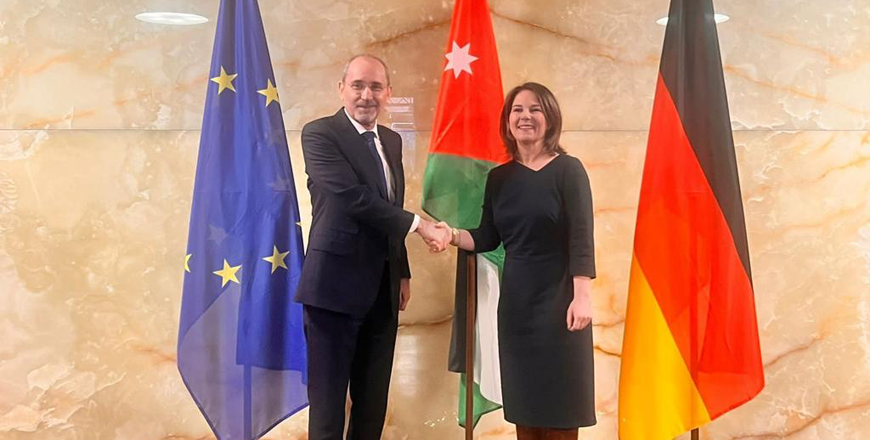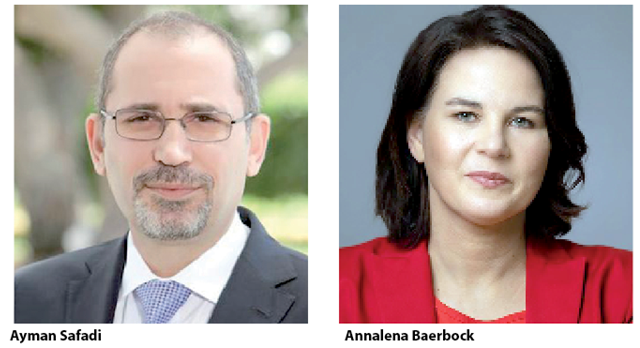You are here
Jordan, Germany say Berlin to host Munich Group meeting in May with focus on Middle East peace
By JT - Apr 04,2023 - Last updated at Apr 04,2023

Deputy Prime Minister and Foreign Minister Ayman Safadi and German Foreign Minister Annalena Baerbock pose for a photo during their meeting in Berlin on Monday (Photo courtesy of Foreign Ministry)
AMMAN — Deputy Prime Minister and Foreign Minister Ayman Safadi and German Foreign Minister Annalena Baerbock on Monday announced that Berlin will host the Munich Group meeting in May aimed at creating a real “political horizon” to achieve a just and comprehensive peace based on the two-state solution.
In a joint statement following discussions in Berlin focused on bilateral relations and the Palestinian cause, the two ministers affirmed that Jordan and Germany consider the Munich Group, which also includes Egypt and France, as an important platform, complementary to de-escalation efforts launched in Aqaba to stop the violence and find real prospects for achieving a just and comprehensive peace, which constitutes a common goal, according to a Foreign Ministry statement.
During the talks, which also focused on the Syrian and Ukrainian crises, the two sides discussed ways to strengthen the strategic partnership between the two countries through economic, investment, tourism, defence and educational cooperation.
The two ministers reviewed opportunities to increase cooperation related to water and renewable energy sectors, as Germany represents one of the largest supporters of Jordan in these sectors.
Safadi briefed his German counterpart on the political, economic and administrative reform programmes launched by the Kingdom.
In regard to the Ukrainian crisis, Safadi reiterated Jordan's calling for ending the war and respecting international law, the UN Charter, as well as Ukraine's sovereignty and territorial integrity.
Praising the positivity that prevailed in the talks he held with his German counterpart, Safadi stressed that the meeting was a conversation between two partners and two countries working hand in hand to achieve security, stability and peace in the region.
Safadi highlighted Germany as an essential partner for the Kingdom, extending appreciation for the strategic relationship and strong friendship that binds the two countries.
Jordan and Germany celebrate the 70th anniversary of the establishment of diplomatic relations, the Jordanian minister underlined.
Safadi expressed Jordan’s appreciation of Germany’s support for the development process in Jordan and for aiding the Kingdom in facing economic challenges and consequences of regional crises.
Referring to the role played by Germany in supporting Syrian refugees in Jordan and the region, Safadi also stressed the importance of Germany's contributions to the UN Relief and Works Agency for Palestine Refugees (UNRWA), as the most supportive country in this regard.
Safadi stressed that Germany is an essential partner for the Kingdom to achieve security and stability and overcome regional challenges, foremost of which is the Palestinian cause.
At a time when there were no effective working mechanisms to contribute to keeping the peace process alive, the Munich Group was “the only one working institutionally and systematically”, Safadi added.
"We are working intensively with Germany to prevent further deterioration of the situation in the occupied Palestinian territories,” he said.
“We are at a crossroads. Either we allow racists and extremists to pave the future path, leading to more conflict and violence, towards a catastrophe, or we, who want peace, will work together to stop the deterioration, achieve calm, and find a real political horizon to relaunch serious and effective negotiations to resolve the conflict on the basis of the two-state solution, which represents the only way to resolve the conflict,” he said.
Safadi highlighted the importance of continuing communication and coordination with Germany in regard to efforts exerted by Jordan to stop the deterioration, including the Aqaba Process, which was the first Palestinian-Israeli political and security engagement under an international, regional umbrella in more than 10 years.
The Jordanian minister stressed that political efforts will not lead to security and peace if they are not manifested in the stopping of unilateral measures that undermine the two-state solution and encourage violence.
"We agreed to continue joint coordination through the Munich Group meeting in Berlin very soon to maintain momentum and work together to reach our main goal, which is achieving security and stability and resolving the conflict on the basis of the two-state solution,” he said.
Safadi stressed that "the violence will not stop unless its causes stop”, attributing violence to illegal Israeli measures, including expanding settlements, confiscating houses, displacing Palestinians, and disrespecting the historical and legal status quo in Jerusalem and its Islamic and Christian holy sites.
Underlining the role of the Hashemite Custodianship over Islamic and Christian holy sites in Jerusalem, Safadi said that His Majesty King Abdullah considers protecting the holy sites a basic priority, devoting all Jordan's capabilities to preserving the historical and legal status quo in the holy sites, maintaining hope for peace and preventing an outburst of violence for which everyone will pay the price.
“Under the framework of a clear partnership, we work together towards one goal, which is to maintain hope for the feasibility of the peace process, as a way to achieve a just and comprehensive peace, rightful to all the peoples of the region,” he said.
"Peace will not be achieved if the independent and sovereign Palestinian state is not established on the lines of June 4, 1967, with Jerusalem as its capital, to live in security and peace alongside Israel on the basis of the two-state solution and in accordance with international legitimacy resolutions,” Safadi stressed.
In response to a question about the recent statements made by the Israeli finance minister, in which he denied the existence of the Palestinian people by presenting an alleged map of Israel including the borders the occupied Palestinian territories and Jordan, Safadi reiterated Jordan’s condemnation of the racist statements, urging the international community to address these actions.
"These statements are racist, inciting, extremist, denying the existence of the Palestinian people, their identity, culture, and civilisation,” Safadi said, warning of the danger of allowing this racist ideology to determine a future, in which more conflict and tension will exist.
Safadi extended appreciation for Germany and the international community's clear stance, which rejected such racism, incitement, extremism, and stressed the need to respect international law and the right of all peoples to life.
“We follow up on issues and deal with each event according to what achieves our goals in protecting the interests of the Hashemite Kingdom of Jordan, supporting Palestinians and their rights, and safeguarding the right of peoples in the region to live in security, peace and stability,” Safadi said.
Safadi reiterated the Kingdom's calling for ending the Syrian crisis, instead of "merely “managing it”, as its repercussions remain catastrophic for the Syrian people and the entire region.
He referred to the Jordanian initiative, which stressed the need for a direct Arab engagement with the Syrian government to gradually resolve the crisis, in coordination with the UN and partners.
Safadi highlighted regional challenges, the consequences of which are reflected not only on countries in the region, but also on European countries, calling for joint coordination to overcome these challenges.
For her part, Baerbock stressed the “solid” nature of the Jordanian-German partnership as well as the continuation of efforts to bolster bilateral relations in various fields.
Highlighting the importance of coordination with the Kingdom to resolve the Palestinian issue and achieve security and stability in the region, the German minister described Jordan as “a key ally”.
During the previous months, the conflict flared up in the Middle East, Baerbock said, stressing the vitality of the Aqaba and Sharm El Sheikh meetings to stop the escalation, especially during Ramadan.
Baerbock stressed that "the two-state solution remains the best solution” to the conflict between the Palestinians and the Israelis.
Jordan is key to achieving stability in the region, she said, underlining the role of the Hashemite Custodianship over the holy sites in Jerusalem.
Baerbock affirmed the readiness of Germany and the EU to support the outcomes of the Aqaba meeting, adding that Germany will host a meeting of the Munich Group to support peace efforts.
The German minister stressed that her country will remain actively involved in efforts to resolve the Palestinian-Israeli conflict and stop spiralling towards violence, and will also remain cooperative with Jordan in efforts aimed at resolving regional crises and achieving security and stability.
She also affirmed that her country will remain Jordan’s partner in achieving economic development and youth empowerment as well as bolster the fields of environment, energy, education and vocational education.
In this regard, she referred to the pioneering project represented by the German Jordanian University in Amman, which was established in 2005, currently including 4,600 enrolled students.
Today's students are the ones who will lead bilateral cooperation in the future, economic cooperation and intensifying joint efforts in the fight against the Daesh terror group, she said.
“On November 17, we celebrate the 70th anniversary of the establishment of diplomatic relations between Jordan and Germany, 70 important years for us,” she said.
Baerbock voiced keenness to strengthen bilateral relations with Jordan.
In addition, Safadi and Parliamentary State Secretary to the Federal Minister for Economic Cooperation and Development Niels Annen held a meeting to discuss ways to strengthen economic and trade relations, reviewed German support for the development process in Jordan, and assistance Germany provides to refugees and host countries.
Safadi briefed the German minister on the Economic Modernisation Vision launched by the Kingdom with the aim of improving economic performance, attracting investment and activating partnership with the private sector.
Safadi also met member of the Foreign Relations Committee in the German Parliament Michael Mueller, and Head of the Middle East Department and Vice President of International Cooperation at the Friedrich Ebert Stiftung Elisabeth Brown, members of the Social Democratic Party, in a meeting that reviewed bilateral relations and latest regional and international developments.
The year 2023 marks the 70th anniversary of the establishment of diplomatic relations between the Kingdom and Germany.
The Jordan-Germany relations are constantly growing in a number of fields including economy, trade, development, tourism, as the two countries’ volume of trade reached $758 million in 2022.
The volume of support provided by Germany to support Jordan’s economic development programmes and help the Kingdom in facing the effects of regional crises for 2023-2024 amounts to 510 million euros of aid and loans, with prospects of increasing it to 610 million euros during the two years, the statement said.
Related Articles
AMMAN — Deputy Prime Minister and Foreign Affairs Minister Ayman Safadi and German Foreign Minister Annalena Baerbock on Friday stressed the
AMMAN — Deputy Prime Minister and Foreign Minister Ayman Safadi on Tuesday met with German Foreign Minister Annalena Baerbock and discussed
AMMAN – Jordan and Germany on Friday underscored the two-state solution as the "sole" formula to resolve the long-running Palestinian-Israel


















